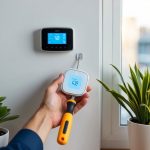DIY Off-Grid Living: Top Tips for Setting Up Your Sustainable Life
Water Collection and Conservation
Water is a crucial resource for sustainable off-grid living. Effective systems for rainwater harvesting, paired with smart water conservation methods, ensure a reliable supply.
Setting Up Rainwater Collection Systems
Rainwater harvesting involves capturing and storing rain by installing systems like rooftop catchments. Homeowners can use barrels or tanks positioned under downspouts to collect rain efficiently. Materials for these storage containers can range from plastic to metal, depending on the budget and environmental conditions.
A filtration system is vital for ensuring that collected water remains safe for use. Simple mesh screens can prevent debris from entering tanks, while more advanced filters might be necessary for drinking purposes. Regular maintenance of collection systems helps maintain water quality and extends system life.
Properly designing and installing a rainwater collection system is critical. The catchment area should be optimized based on average rainfall in the region. This information allows for appropriate sizing of storage solutions. By understanding local hydraulics, systems can be configured to effectively capture and store sufficient water supplies year-round.
Implementing Water Saving Techniques
Water management strategies are essential in off-grid living scenarios. Low-flow faucets and showerheads reduce water usage without compromising performance. Such fixtures can significantly decrease daily consumption in households.
Reusing greywater—water from showers, sinks, and laundry—is another effective technique. This recycled water can be used for irrigation, thereby conserving potable water. Systems to treat and manage greywater efficiently require consideration of local regulations and environmental impacts.
Regular checks for leaks and timely repairs prevent unnecessary water loss. Simple practices like turning off taps while brushing teeth or installing dual-flush toilets also contribute to reduced consumption. By integrating a combination of these methods, individuals living off-grid can manage their water resources efficiently.
Power Storage and Management
Efficient power storage and management is crucial for sustaining an off-grid lifestyle. Investing in the right battery systems and ensuring a consistent energy supply can significantly enhance reliability.
Battery Systems
Choosing the right battery technology is essential for effective energy storage. Lithium-ion batteries are a popular choice due to their efficiency and longer lifespan compared to lead-acid batteries. Weight and size considerations can also influence the choice, as lithium-ion options are generally more compact.
Installation requires careful planning to maximize space and optimize battery performance. Safety measures should be prioritized to prevent overheating or leaks. Proper ventilation and consistent maintenance will help extend the system’s life. It is advisable to monitor battery health through regular check-ups to ensure they remain in optimal condition.
Maintaining Energy Supply
To maintain a stable energy supply, integrating an efficient inverter system is necessary. Inverters convert the stored DC power into AC power for home usage. It’s important to select an inverter that matches the system’s voltage and power capacity needs. Additionally, inverters with built-in MPPT controllers can optimize solar energy collection.
Installing backup systems like small generators or wind turbines can provide additional security during low sunlight periods. Monitoring setups, which track energy usage and storage levels, can prevent shortages and enhance efficiency. Smart power management involves adjusting consumption habits, such as using energy-intensive appliances during peak generation times, to match supply with demand effectively.



